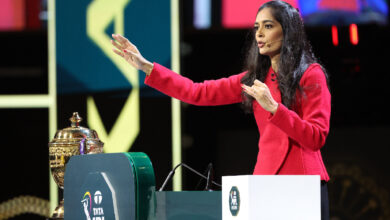Postponed, Asian Games stare at cramped 2023 calendar and uncertainty amidst China’s Covid-19 outbreak

Assuming it’ll go ahead as scheduled, China will host 23 nations for the Asian Cup, the continent’s showpiece football championship, in June and July next year.
Then, in the following month, a series of major international events will get underway, kick-starting the countdown to the Paris Olympics. In August, athletics, swimming, sailing, archery and badminton, most likely, will have their world championships. That’ll be followed an equally packed September, when the world championships for basketball, canoeing, gymnastics, boxing and wrestling (for whom, the worlds will double up as the Olympic qualifiers) will take place.
As it tries to find a slot for the postponed Hangzhou Asian Games, which were scheduled to be held from September 10 to 25, the Olympic Council of Asia (OCA) is staring at a narrow window where no major championships are already scheduled to conduct its flagship event.
The continental body announced on Friday that even though the organisers were ‘well prepared’ to host the Asian Games, the decision to postpone it was taken ‘considering the pandemic situation and size of the Games.’ More than 11,000 athletes from 44 countries were set to compete in 40 sports, making the Asian Games nearly as big as the Olympics, in terms of size.
But while pushing back the event, the OCA did not reveal when the rescheduled Games will be held. “The new dates of the 19th Asian Games will be agreed between the OCA, the COC (Chinese Olympic Committee) and the HAGOC (Hangzhou Asian Games Organising Committee) and announced in the near future,” the continental body said in a statement.
‘Surprised’
Although it was being speculated for a while, the decision took many surprise. While the organisers were presenting their case to the OCA in Tashkent, an Asian Games test event for rowing, one of the many held in the last few weeks, was reaching its conclusion in Hangzhou. In Bangkok, the hockey qualifiers got underway and in New Delhi, the committee that monitors preparations of India’s Olympic athletes was in the middle of its meeting in which Asian Games were on the agenda when the news flashed.
“The decision is surprising,” Indian Olympic Association president Narinder Batra said. “I am not happy with it especially since the fresh dates or at least tentative month have not been declared. The lack of clarity affects the planning and preparation of the athletes.”
The postponement comes despite the OCA vehemently denying reports suggesting the same in the last few days and with organisers pressed ahead with their preparations to host the event in a strict bio bubble.
But in the backdrop of rising Covid-19 cases in China, a delay seemed inevitable. China, where the virus emerged in late 2019, is experiencing its biggest Covid-19 outbreak. The Games’ host city began mass testing its 10 million residents last week to keep omicron cases in check. A short train ride away from Hangzhou, Shanghai has been under a strict lockdown for more than a month and China’s capital Beijing, too, has begun tightening its Covid curbs.
Logical nightmare
With China yet to open its borders for international visitors, in its dogged pursuit of a zero-Covid policy, the country has been forced to cancel or postpone several sporting events. Moments after the Asian Games were postponed, the World University Games, which were to be held in Chengdu, too were pushed back to 2023 while the Shantou Youth Asian Games were cancelled altogether. And although they are still a year away, China’s strict border control and zero-Covid policy have cast a shadow on the Asian Cup.
Despite these setbacks, officials have suggested that the Asian Games organisers are considering the option of staging the games during the same window next year. However, slotting the mega event in an already packed calendar can prove to be a logical nightmare.
When the Tokyo Olympics were pushed back a year, from July-August 2020 to July-August 2021, several sports, including badminton and swimming, were forced to reschedule their world championships. Whether the Asian Games organisers can convince the international federations to do the same once again remains to be seen given that it can have a domino effect on the Olympic qualification system.
Reducing workload
But not all will be disappointed. For some Indian athletes, the postponement could be a blessing in disguise, as it gives them room to rest in a busy year. In normal circumstances, athletes in some sports, like track and field, were facing scenarios where they’d have to compete in three back-to-back major championships: the World Championships (July 15 to 24), the Commonwealth Games (July 28 to August 8), and then the Asian Games. The postponement is likely to reduce their workload.
It’ll be the same for the hockey players. To focus on the Asian Games, where an Olympic berth is at stake, Hockey India had decided to send second-string sides for the Commonwealth Games. Now, with the Asiad out of the picture, Hockey India has a decision to make: whether to disband the India ‘A’ teams; stick with them for the CWG; or include a few senior players in the mix. One of the many uncertainties the postponement has caused.







